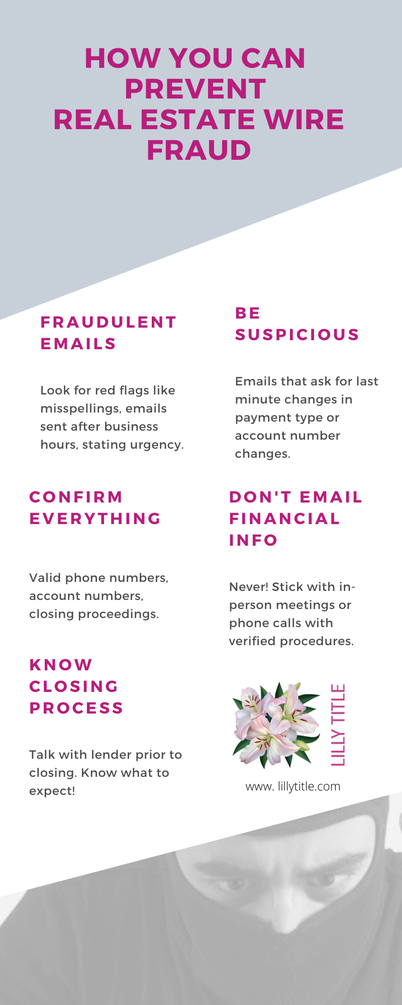
Think Jesse James stole a mountain of money? It’s nothing compared to what cyber criminals steal with real estate transactions.
A lucrative, nefarious business that shows no sign of slowing down, real estate wire fraud scams are increasing every year.
In 2017, the FBI reportedly received 301,580 complaints about real estate wire fraud with losses exceeding $1.4 billion dollars.
Yes, that’s billions with a “b.” There were more than 9,600 victims who lost over $56 million in broken dreams.
Compare that number to more traditional thefts like bank robberies. A thief is limited by what can be carried. With cyber crooks, there’s no limit on how much cash they can steal. But how does it happen? And what can you do to protect yourself?
Here’s a look.
How You Become A Target for Real Estate Wire Fraud Scams

Even though, worldwide, businesses spent $93 billion fighting cybercrime in 2018, humans continue to be the weakest link.
Any party involved in a real estate transaction is a target for hackers. That includes the real estate agent, the buyer, the seller, the title company, closing attorney, and the financial lending institution.
And it all starts with a hacked email. A fraudster hacks into the lender or title company’s server searching for upcoming real estate closings.
The scammer then assumes the identity of the real estate or title company, or the financial institution handling the real estate sale.
The business emails you receive look authentic but if you look closely, you’ll usually see a few letters missing in the email address.
The fraudsters will claim that the wiring instructions have been changed, and that it’s urgent for you to transfer funds immediately. To delay, they claim, will hold up the closing.
The fraudulent email is to provide you with new instructions for the wire transfer. That transfer, of course, is to the scammer’s account.
Protection from Real Estate Wire Fraud Scams is a 2-Way Street

What’s more, because email is commonly used to communicate during a legal transaction, it makes it that much easier to scam people.
That means that all parties have to be hypervigilant so that the closing goes smoothly.
At Lilly Title & Settlement, here’s what we do to guard against wire fraud:
- We establish a phone procedure for calling us using a confirmed phone number. This verifies the legitimacy of the wire instructions received by fax or email.
- We use encrypted emails with our wire transfer instructions.
- Then we verify by email that the wire transfer instructions were received. Additionally, we verify the information and instructions prior to sending funds on your behalf.

- Look for red flags that are usually associated with fraudulent emails. For example, stating the matter is urgent, misspellings, and emails sent after business hours.
- Be suspicious of any email that states a change in payment type. For example, from a certified check to wire transfer. Or a last-minute change in account numbers.
- Know your closing process beforehand. We’ll talk with you prior to settlement so that you know exactly what to expect.
- Talk with your lending institution about valid payment methods. Discuss with your lender about how the money is to be wired.
- Confirm everything! Ask your lending institution to confirm the account number as well as the name on the account before proceeding with the wire transfer. Don’t follow emails with instructions on wiring money. You might think it’s legitimate but it’s best to contact a representative directly to be sure.
- Only use the phone numbers you trust. Scammers will fake phone numbers. Don’t fall for it!
- Don’t email your financial information—EVER! It’s just not safe. For the safety of your money, stick with phone calls or in-person meetings to share important information.
- If you receive an email about last minute changes to wiring instructions, ignore it! Do NOT call the number in the email.
- Watch out for phone calls! It’s difficult to tell whether a phone call is legitimate or scammy. If anyone asks you to confirm your identity, hang up.
- If you’re concerned you may have been the victim of wire fraud, call the lending institution immediately. Get them to issue a recall notice on the wire transfer. Then, report the crime to ic3.gov. Call your regional FBI office and local police.
Buying and selling a home is an exciting time. Don’t let someone else’s greed ruin your dream of homeownership.
Educate yourself on the dangers of real estate wire fraud scams. Follow what your lender, title company, and settlement agency tell you to do for the closing.
Just like you, they have an investment in getting the transaction closed. Use their experience to your benefit so you can get on the road to homeownership!
At Lilly Title & Settlement, we take every precaution to ensure that your real estate transaction is safe, smooth, and secure. Learn more about us here.
 RSS Feed
RSS Feed